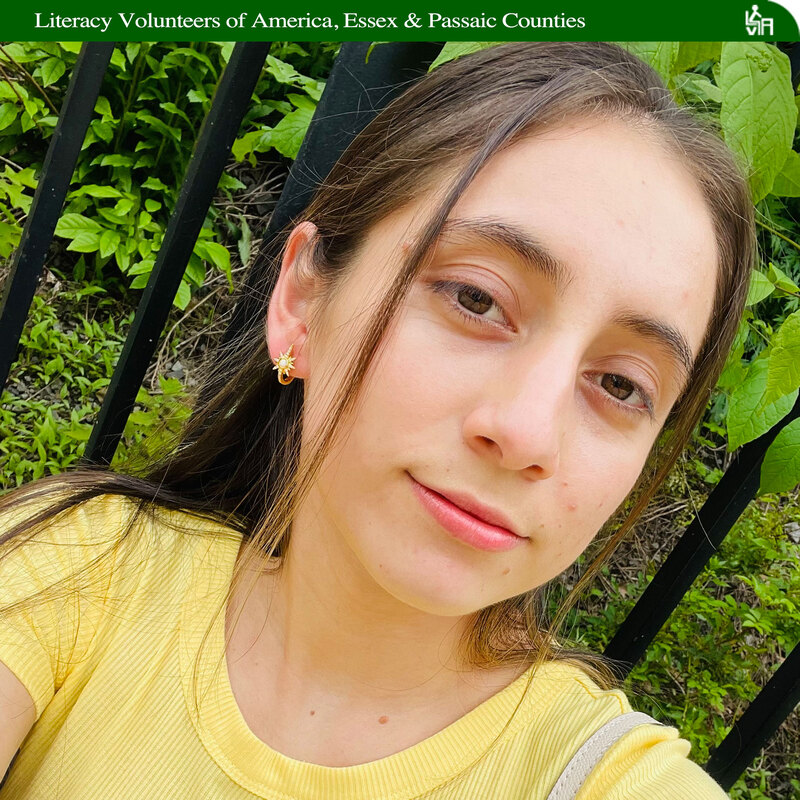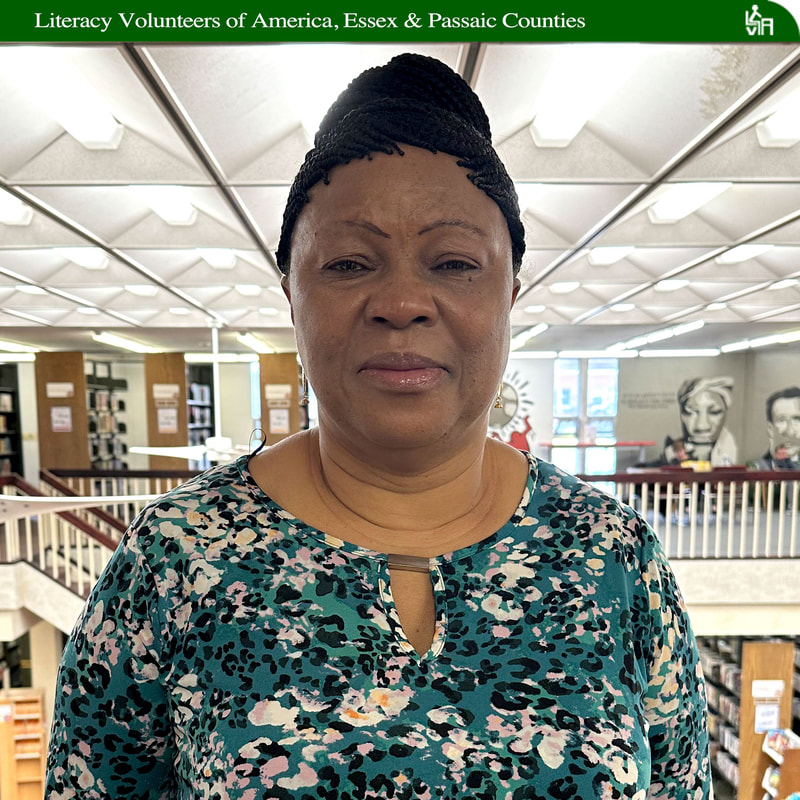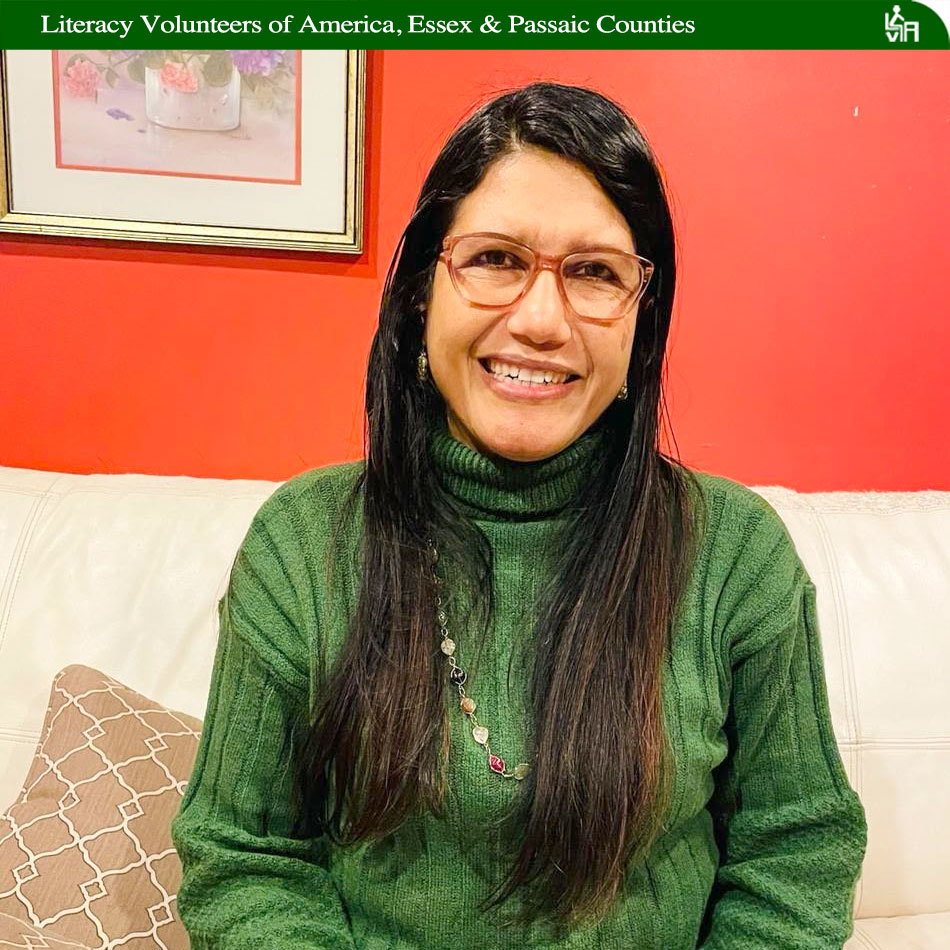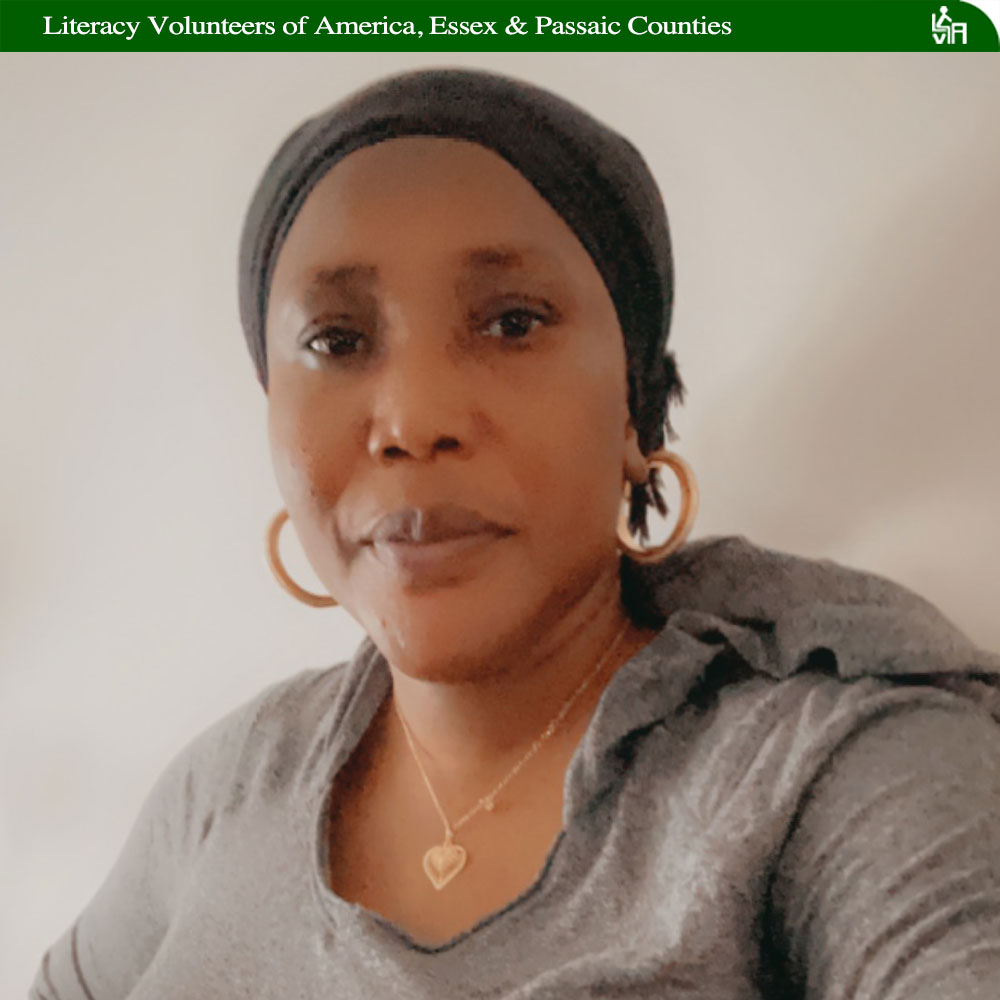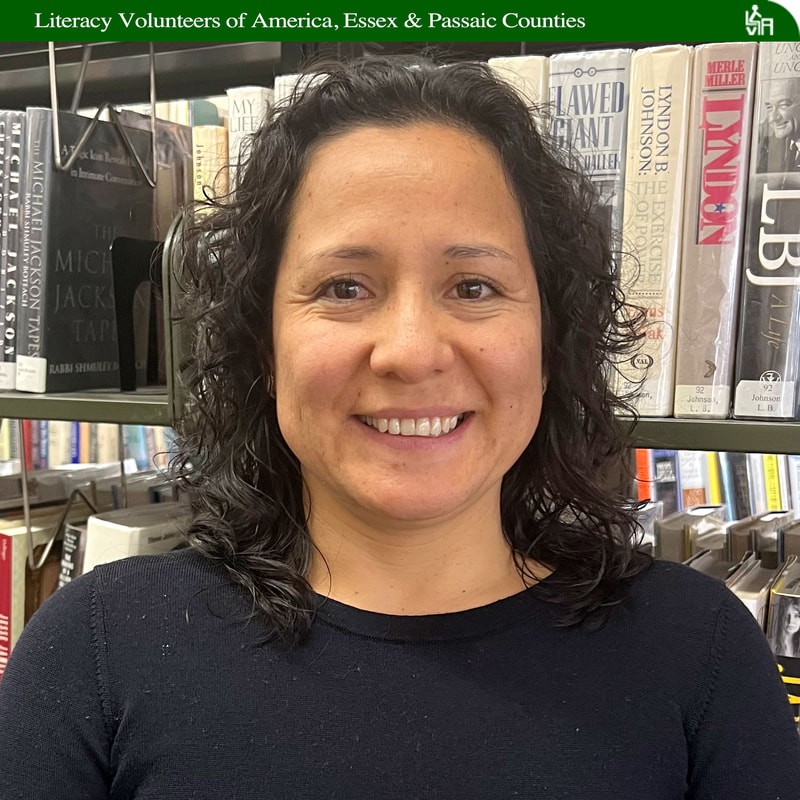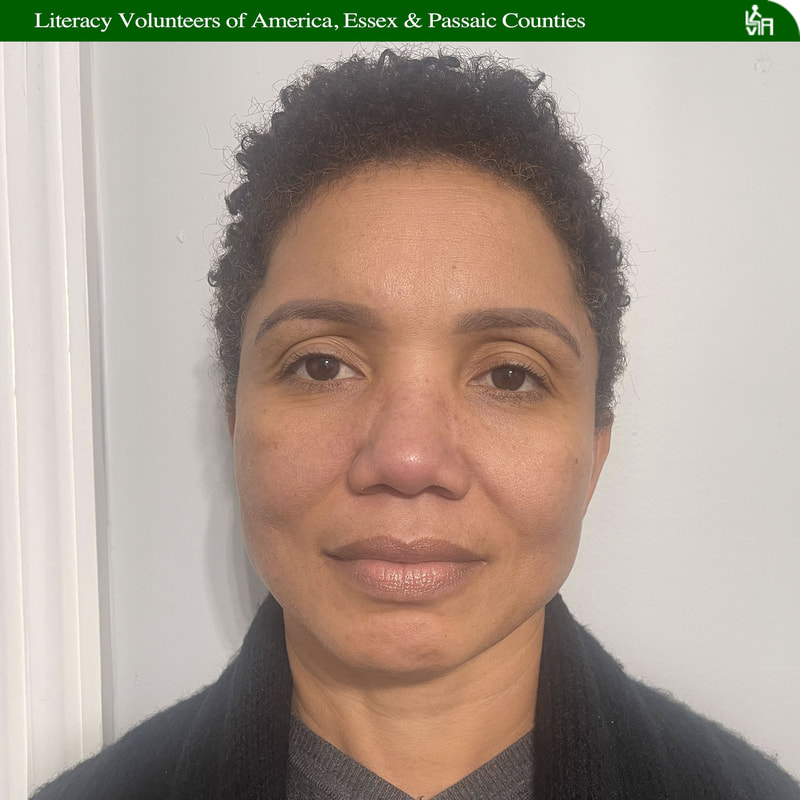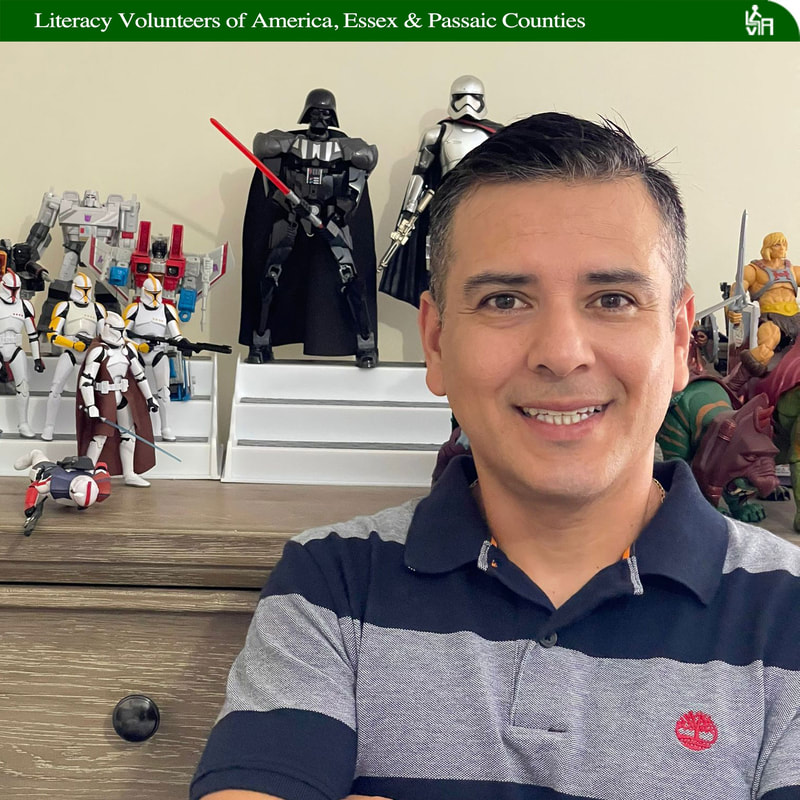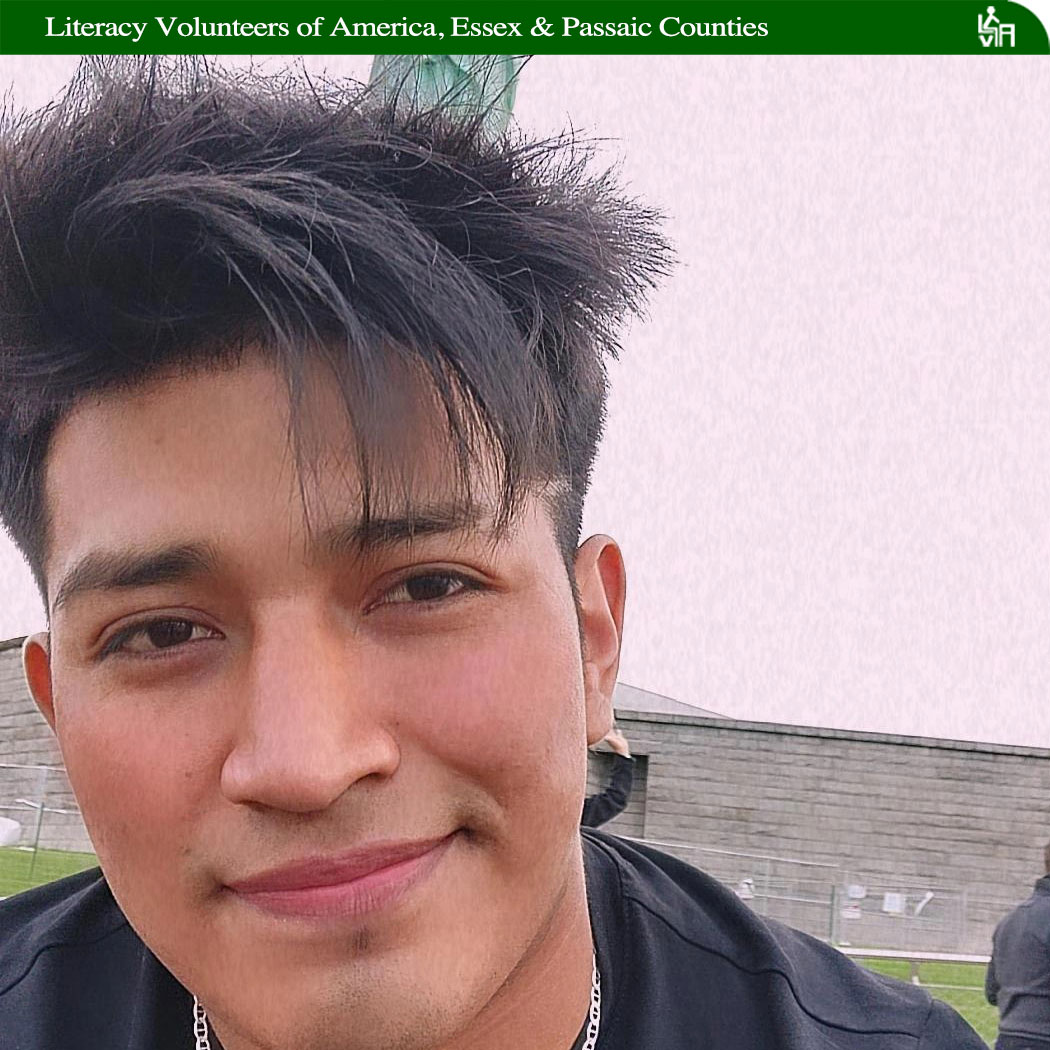Students' Success Stories 2022-23
We all enjoy success stories. They are positive messages about overcoming obstacles, working hard for the reward, and finding satisfaction in completing challenges. Read about the students who have obtained citizenship, those who escaped war torn countries and now have assimilated into American society and absorbed our culture, and those who finally read a bedtime story to a young child or grandchild. That last achievement has a special significance for a Basic Literacy student after a lifetime of frustration and low self-esteem. Here at Literacy Volunteers of America we like to celebrate all those positive events in our students’ lives. Sometimes we celebrate with hugs and treats, but most often, we share these achievements with others through this page on our website. That way all of our LVA community can share in the celebration of their success!
RosaIn a small classroom at Literacy Volunteers of America Essex and Passaic Counties, Rosita Guerra, an immigrant from Honduras, sat among a diverse group of English learners, each on a unique journey of their own. Despite the language barriers that once hindered her, Rosita's determination and resilience shone through as she shared her inspiring story of growth and empowerment.
Originally from Honduras, Rosita embarked on a challenging journey to the United States about a year ago. Her path was fraught with difficulties, enduring cold, hunger, and even persecution from the police during the arduous 15-day trip. Rosita recalled the constant fear of being caught and sent back to her home country. Nevertheless, with unwavering determination, she successfully reached the migration-center at the border, where she was eventually placed in a group home before reuniting with her relatives. During this transitional period, Rosita discovered the invaluable resource of Literacy Volunteers of America (LVA). Upon the recommendation of Miss Marisol Ramirez, from New Community Corporation, she enrolled in an English class at LVA. Learning English became a crucial step for Rosita, as she recognized that it held the key to her personal and professional development. For the past six months, Rosita has been diligently improving her English skills. While she acknowledges the challenges of grasping a new language, she takes pride in her progress. Grammar remains a particular area of focus for her, as she seeks to master the art of constructing coherent sentences in English. Rosita's educational journey in Honduras was cut short after completing high school. However, she carries immense pride in this accomplishment, which required her parents' unwavering support and many sacrifices. Now, Rosita sets her sights on pursuing higher education in the United States to further improve her opportunities for a brighter future not only for herself but also for her family in Honduras. Rosita has faced numerous setbacks and failures throughout her English language learning journey. One of the most significant obstacles was her father's accident, which resulted in his foot amputation when Rosita was only 12 years old. The family was thrust into hardship, requiring Rosita to step up and help support her father and the household. Despite the challenges, Rosita's resilience and determination have endured these difficult times. The impact of learning English on Rosita's life cannot be understated. It has provided her with a newfound confidence, enabling her to communicate and engage with others in her community. While Rosita recognizes that she still has much to learn, the supportive tutors at LVA have played a pivotal role in her progress. Looking to the future, Rosita is committed to working hard and pursuing her dreams. She aspires to continue her studies at a university to help secure a better life. Rosita's advice to fellow English language learners is to never give up and face life's challenges with determination and perseverance. Rosita Guerra's story serves as a testament to the transformative power of education and language acquisition. Through her tenacity and the support of organizations like Literacy Volunteers of America, Rosita has embraced the opportunity to learn English, opening doors to new horizons and empowering herself to navigate her journey in the United States with confidence and hope. |
MarieAs the eldest of seven children, Marie spent her childhood caring for younger siblings and working in her family’s fields in a small West African village near Macenta, Guinea.
She worked alongside her parents—and sisters and brothers as they became old enough—to grow their food and crops including cassava and coffee. Later, as a businesswoman, she traveled West Africa buying goods like rice, palm oil, and clothing which she sold in marketplaces in the Guinean capital, Conakry. The place she didn’t spend any time at all was inside a classroom. “I did not go to school in Macenta,” said Marie. “Nothing, nothing. I took care of the baby sisters, brothers. I worked, I got married, I started a business.” Marie has a trader’s spoken knowledge of French and speaks four West African languages but never learned to read or write. Today, she is a beginning literacy student on a quest to improve her English communication, in part, to be more successful at work. “She’s made great progress,” said Eve Peterson, a volunteer literacy tutor who works with Marie twice each week. “She never went to school. When she came to the U.S., she literally hadn’t had any formal instruction at all.” The two works on a range of areas, including conversation, comprehension, reading, writing, vocabulary, even the language of numeracy. “She gives to me a lot of things, a lot of good material,” Marie said of Eve. “She’s shown me a lot of things. I like the work she does with me. She’s helping me in a lot of ways. She’s good people.” Back in Guinea, life was difficult for Marie even as an adult. She became a mother but, tragically, all but one of her children died while very young. “It was not easy, papa,” she said during a telephone interview. “In that part of Africa, we did not have a doctor.” After Marie’s husband passed away, she traveled to the U.S. —to work not as a merchant, but as an entertainer. She was part of a troupe of West African singers and dancers accompanied by drummers who played the rhythms for which Guinea is famous. They performed at festivals, in halls, and at private events, in New York, New Jersey, Philadelphia, Boston, Baltimore, and Washington, D.C. A financial issue with the group’s promoter eventually all but ended bookings and Marie started braiding hair to make money. Today, she is a hair stylist in a salon where she specializes in African hair braiding, something she learned as part of village life and has been doing ever since she can remember. And that’s where her studies with her tutor have proven the most beneficial, according to both student and tutor. “She felt bad that people coming into the shop couldn’t understand her,” explained Eve, Marie’s tutor. “She wanted to establish a rapport with her clients. Many people have told her that her English has improved.” |
MabelLearning English was more than an assimilation goal for Mabel, who arrived in the U.S. last year from the Dominican Republic. It was a medical urgency.
Her mother, who lived in the states, had become severely ill and Mabel became her primary caretaker and advocate. “The most difficult thing for me was not being able to communicate with my mother's oncologist, since she did not speak Spanish at all,” Mabel explained. Latinos make up about 19% of the U.S. population but only about 5.8% of the physician workforce, according to the American Medical Association. The lack of English fluency leads to disparate health outcomes for members of the U.S. Latino community, particularly recent immigrants and older populations, studies have shown. To enhance her role as a health advocate, Mabel enrolled in an English class in Passaic. It is one of a series of ESOL classes that LVA offers in cooperation with the Reid Memorial Branch and Passaic Public libraries in Passaic, and the Hilton Branch of the Maplewood Memorial Library. And Mabel soon saw an improvement. “The class is important for me because I can read, I can write, I can speak more English today,” Mabel said. “The class is excellent. The teacher is very qualified. It feels more like family. I love my class.” Sadly, Mabel’s mom passed away in December. Mabel opted to remain behind to handle her affairs and, while here, apply for work in customer service, the field she’s worked in back home. Her ideal job, since she loves to sew, would be to launch her own clothing design company. “Taking English classes has helped her overcome her fear of speaking in public, and given her hope that she actually might make her dream of owning her own business a reality,” Karen Cardell, Mabel’s teacher at the Passaic library, wrote in a report on the student. Mabel continues her studies today with the help of the language-learning app Duolingo and by watching English language movies nightly. She was born into a large family in San Francisco de Macoris, in the northeast of the Dominican Republic, and grew up in Santo Domingo, the nation’s capital. She earned a college degree in marketing and, for fun, played volleyball on school and club teams, playing several different positions, including her favorite as a spiker. Mabel said she feels safer in the U.S. but misses her family – her husband continues to work back home and her grown children live in Florida and Spain – as well as the Caribbean sun and beaches. “The weather is terrible here,” she said with a laugh. |
AwaAwa was already multilingual when she left Mali, well-versed in elementary school French, Mandingo or Mandinka, which she spoke at home, and several other African languages she learned as a merchant.
But that proved little help to her in New York City, where she arrived 2012, at least not when it came to navigating the subway system during job searches. For that she depended on her cell phone, her sister, and the kindness of strangers. “If I wanted to take the train but didn’t know which train, I would say to a stranger, ‘Please, my sister wants to talk to you,’ ” she said, describing with a hearty laugh how she’d pass her cell phone to some straphanger she’d just encountered. “And then I would talk to my sister in Mandingo and then my sister would talk to that person. I didn’t know what was uptown or downtown.” Awa left school early back in Bamako, capital of the West African nation where she was raised, in order to help her mother, a merchant who sold clothing and other products throughout Mali, Senegal, and Liberia. Learning another language, particularly as an adult, has not been easy but Awa’s progress is evident. She’s passed her written driver’s test and, just months ago, passed the test to become a home health care aide, earning her certification and starting work in the field last November. She’s been with us for three years and meets with tutors online for several hours each week. “The library has helped me a lot,” Awa said of the LVA program. “When I first got there, I could not speak like this. Mayda and Diana, they have helped me a lot,” she said of her tutors. Diana Fennelly, one of Awa’s tutors, said she’s found good results by using a Wordwall program to send material to her student virtually. “She’s hard-working and has a great sense of humor,” Diana said of Awa. “She’s been with me for about a year. She’s wonderful.” Awa would eventually like to earn a GED, find a job in a nursing home or become an entrepreneur, and gain U.S. citizenship like her Guinea-born husband. Outside of class, Awa said she practices English with a niece and watches English-language movies and television and she lists her media preferences with the same good-natured laugh heard throughout our telephone interviews. “Sometimes I listen to Judge Judy; and Madea,” she said, the latter a reference to the movie and stage play character created and played by actor-director-producer Tyler Perry. “I watch a lot of movies if I have time. And the news too.” |
MagalyMagaly faced the usual daunting obstacles that confront new arrivals to the U.S. from Latin America and other countries.
Her minimal grasp of English made it difficult to understand others, including vital contacts like her family doctors and children’s teachers. And those same language barriers hampered her job prospects. Nine years later she is an intermediate student, with an ease of speaking English that comes from years of practice, in her case time spent studying at an Orange adult learning center, at Essex County College, and now at LVA. She also practices with her children – a son, 14, and daughter, 12 – and enjoys English language movies. Her progress is likely due to a steady work ethic she gained at the hands of her late father, a former police officer, and her mother, who stayed home to raise Magaly and her seven siblings. “My dad, who died two years ago, taught me to always work hard to get ahead,” said Magaly, who works as a housekeeper but aspires to a job in the medical field. “He always did that.” For four months, Magaly has worked with tutor Mary O’Connor on everything from grammar to writing in a group that includes students from Egypt and Brazil. Magaly “works very hard to improve because she really wants to get back to a level of a job that is commensurate with her background,” Mary noted. “She really puts the effort into it. I’ve not only seen an improvement but a confidence that seems to be growing.” Magaly is a native of Azogues, an Andean city in south-central Ecuador. She studied the fundamentals of electricity in school and graduated to find herself one of only a few female electricians in the city. “It was unusual to find a female electrician at that time,” Magaly said. “I knew only about two female electricians in my town, who were still in the college, and they said it wasn’t easy because the men didn’t like women to be electricians.” It wasn’t her first choice anyway. “I wanted to be a police officer but my father didn’t like the idea because it was very dangerous,” she explained. There also wasn’t much work for her as an electrician. As she does today, Magaly assisted her husband with his electrician practice but wound up working in libraries, first in “SINAB”, Ecuador’s national system of public libraries, and later in a middle school library. At the latter she helped children improve their reading skills, guided them through writing and art projects, helped them with homework, and accompanied them on cultural trips. Outside of work and her studies, Magaly enjoys spending time with her husband, children, and two sisters who live in the metropolitan area. She takes frequent walks in the park with her pet, a Maltese-Poodle mixed breed dog named “Muneca”, which is Spanish for “doll.” |
RossiFarmacéutica is not just a word on Rossi’s resume; it’s her passion. And, for a quarter of a century, it was career.
“I love to help people,” Rossi, a literacy student from the Dominican Republic, explained as her motivation to become a pharmacist. Even so, pharmacy wasn’t her first choice when she considered a field that could help the masses. That was journalism, she said, a career her mother disapproved of. So, Rossi, who was already working as a drug store assistant, opted to learn pharmacy. After five years of study, she left the Universidad Autónoma de Santo Domingo with a college degree, a pharmacist’s license, and a bright future. She would spend the next 25 years as a pharmacist before leaving for the U.S. in 2017. Rossi noted that pharmacies in her home country operate differently from those in the U.S. There, many medications are available without prescription or are prescribed right there at the drug store, after a patient is interviewed by the pharmacist, according to published reports. “In my country if you have a backache or stomachache you go to a pharmacy and say I need some medicine to help me,” she recalled. “In some cases you don’t need a prescription because some people in my country may not want to go the doctor.” She’s pining to get back to her career but first must get past her fear of speaking English. “Í would love to work in my area, pharmacy, and I have plans to do that, eventually,” said Rossi who, for now, earns a living by shopping for and delivering groceries to clients. “I still have some fear that when people speak to me I won’t understand. At times I feel very scared.” Part of her issue is that, outside of her library classes, she hasn’t found many folks to practice with, not even family members. She laments that, when she tries to speak English with her husband, who is Dominican, or her daughter, age 21, they either answer in Spanish immediately or do so within minutes. “It’s difficult,” Rossi explains. “I didn’t work at any time with American people. I believe this is my biggest problem because I never worked in an American area.” Nevertheless, Rossi was able to understand questions posed in English and able to respond in English, during our telephone interviews. She spent a year studying English at Bronx Community College before enrolling in LVA where she studies weekly with two tutors. In addition, she said “I read and sometimes I watch TV in English. And sometimes I listen to American music. When I don’t understand something, I look it up in a dictionary.” She also uses Google for translation help, she added. Rossi likes to spend time with her family, including her husband, daughter, son, age 24, mom and three of her four brothers, who all live in New York and New Jersey. She also enjoys reading and attending church. |
VictorThis is how you come fluent: Surround yourself by speakers of your target language and engage them daily. At least that’s how Victor, an English student from Peru, did it.
“All my neighbors are Americans,” explained Victor, who can actually chart his progress by talks with fellow building residents. “When I first rented my apartment, I said to my neighbors just ‘Hello’ and ‘How are you?’ and that’s it.” But improvements came quickly. They almost had to: Not only are his neighbors’ native English speakers but so are the clients of the construction company where he works and the Italian restaurant where he delivers food. “Now I can communicate with them,” he said, citing his suburban neighbors. “Now I can talk a lot of things about the building, the amount of the rent, the service. That’s so great.” Victor arrived in the U.S. two years ago. He’d earned a bachelor’s degree in economics and a Master’s of Business Administration degree in Lima, where he was raised with three siblings and worked as a commercial manager of a construction company. Here he works as an assistant manager for another construction company, one that installs and refurbishes floors and ceilings. This too requires frequent use of English, both verbal and written. “I do proposals and invoices and mailings to customers, always in English,” he explained, adding that he uses Google Translate to check his work. In his second job, as a deliverer of restaurant food, Victor found himself counting money in English, which surprised even him. Victor lives in Essex County with his wife and two daughters, ages 8-years and four months. An older daughter and other family members remain in Peru. He said he loves to take long walks in a park near his apartment and has joined the YMCA where he swims with his daughter and works out in the gym. And he has another passion: He can’t resist adding pieces to his already massive collection of Star Wars figures; the Force is too strong. He might just own enough replica figurine fighters to engage in intergalactic warfare of sorts. His favorite: Darth Vadar, one of the most iconic villains in pop culture. “Here, I think I have more than 500 pieces. I don’t have space for all my pieces,” he said with a laugh. |
EsdrasEsdras began his restaurant career at the bottom, as a dishwasher in the sweltering kitchen of a busy suburban eatery. Today, he’s the chef.
His rise began only a couple of years after his start, when managers saw something promising in the eager and good-natured young man, a former vegetable farmer from Guatemala. So, they taught him to cook. Lessons covered traditional Italian fare – preparing everything from spaghetti and meatballs to lasagna, baked ziti, ravioli, and other flavorful dishes. After a three-year apprenticeship, the job was his. “It was a great time when they told me that,” Esdras said. “I was learning and I enjoyed it. So when they told me ‘Oh, you want to be a chef?’ I said ‘Sure, that is my dream’.” Actually, it’s just one of his dreams. “I have so many plans for my life,” Esdras explained. “The first one is I want to start a small business. I want to open a restaurant, an Italian restaurant.” Or, he added, it could be a breakfast and lunch place that serves American cuisine. Or maybe something else. “In this county there are so many opportunities we can take to make our lives better and help our families,” Esdras said. “We come to this country for the opportunities, to make something good of ourselves.” Perfecting his English is an important part of the plans, he added. At LVA he studies the language with two tutors each week. “He is such a pleasure to work with, always taking the initiative to volunteer to read and answer questions,” said tutor Renee Porcile. “Esdras has boosted his confidence over the 10 weeks that I’ve had the pleasure of tutoring him. He always asks the right questions which assures me that he is grasping the material.” Esdras was raised with four siblings on a farm in Tecpán, Guatemala. He completed high school and studied agriculture in college for two years. Even though he has a high school diploma, he attends a GED program here in the states. That’s not unusual. Many immigrant students with high school diplomas earned overseas do the same, mainly to take advantage of the extensive English vocabulary and grammar that GED programs offer, often with affordable tuitions. In his spare time, Esdras enjoys playing soccer as a midfielder, watching Netflix movies in English with English subtitles, and practicing English with neighbors. He even moved, from a Spanish-speaking neighborhood to an English-speaking one, in order to get more practice, after his former neighbors insisted that he speak to them only in Spanish. “I said ‘But we need to practice English because that is very important in this country’,” Esdras recalled. “It doesn’t matter if we are Spanish or Chinese, or whatever. We are in the United States, we have to speak English.” |

